牛津高中英语选修七 Unit 2 Fit for life Reading Two life saving medicines课件(47张ppt)
文档属性
| 名称 | 牛津高中英语选修七 Unit 2 Fit for life Reading Two life saving medicines课件(47张ppt) |
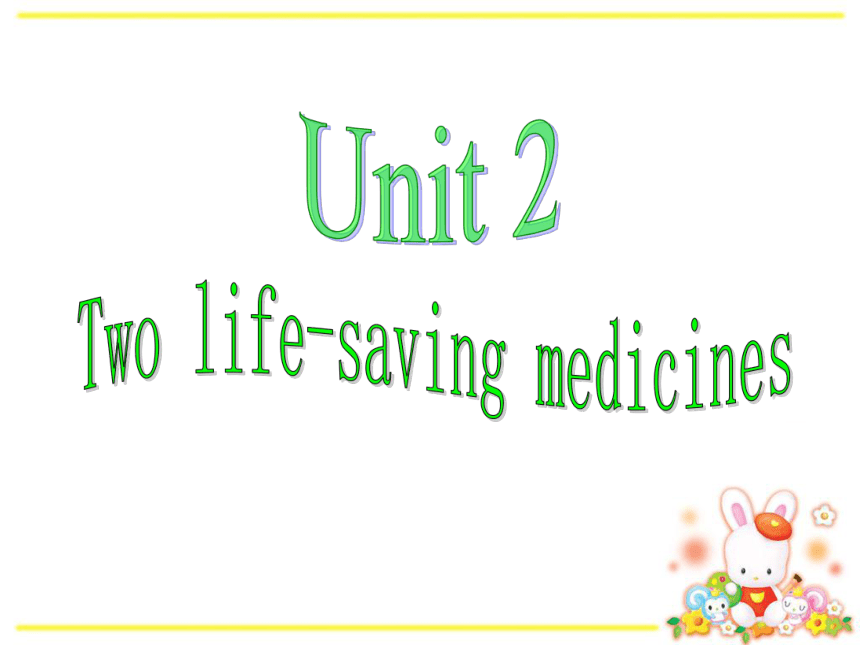
|
|
| 格式 | zip | ||
| 文件大小 | 1.9MB | ||
| 资源类型 | 教案 | ||
| 版本资源 | 牛津译林版 | ||
| 科目 | 英语 | ||
| 更新时间 | 2020-09-23 00:00:00 | ||
图片预览

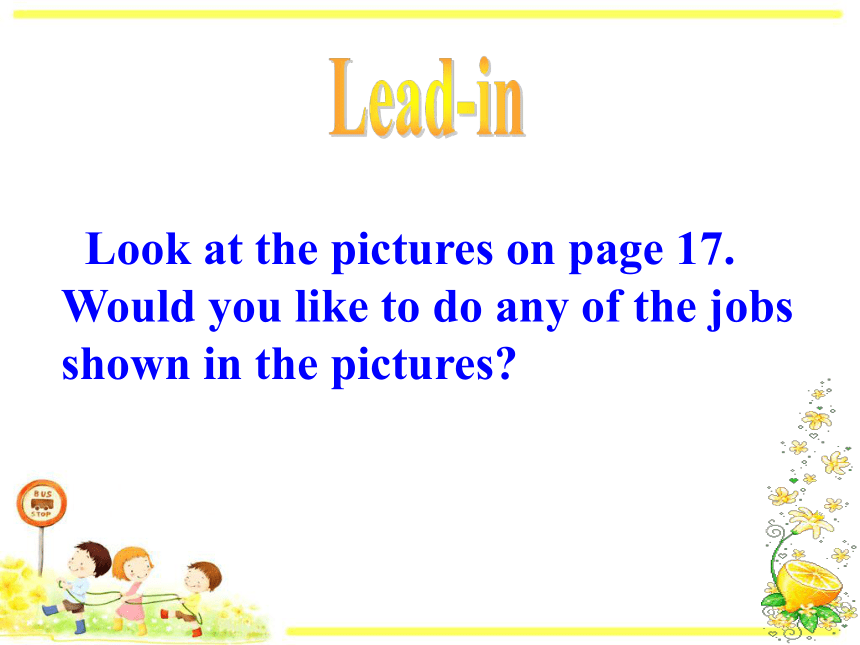

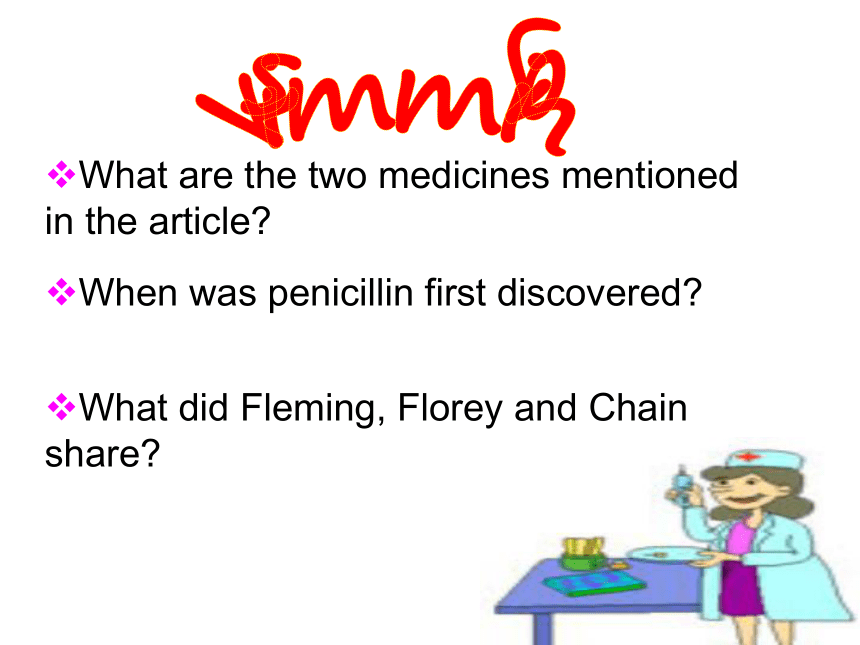
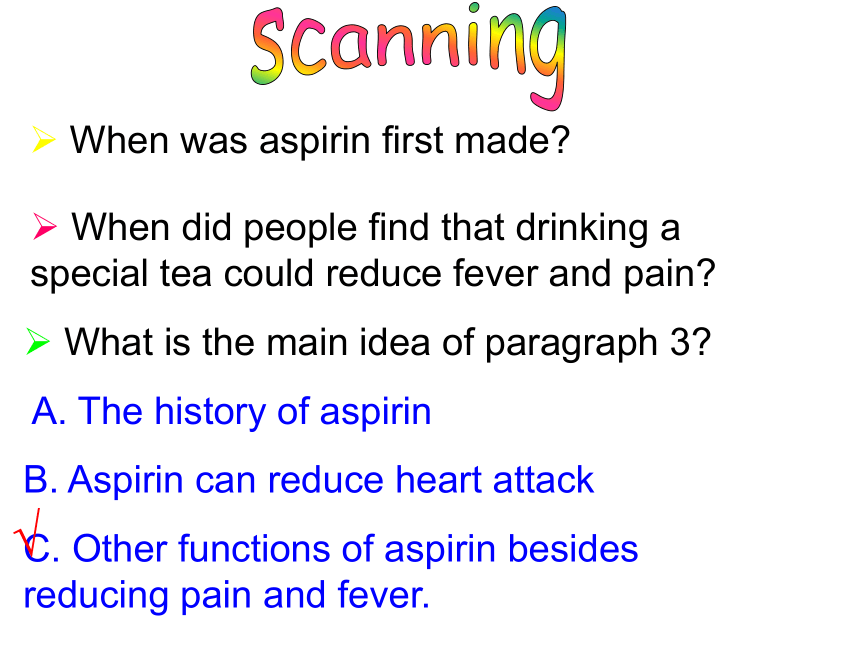
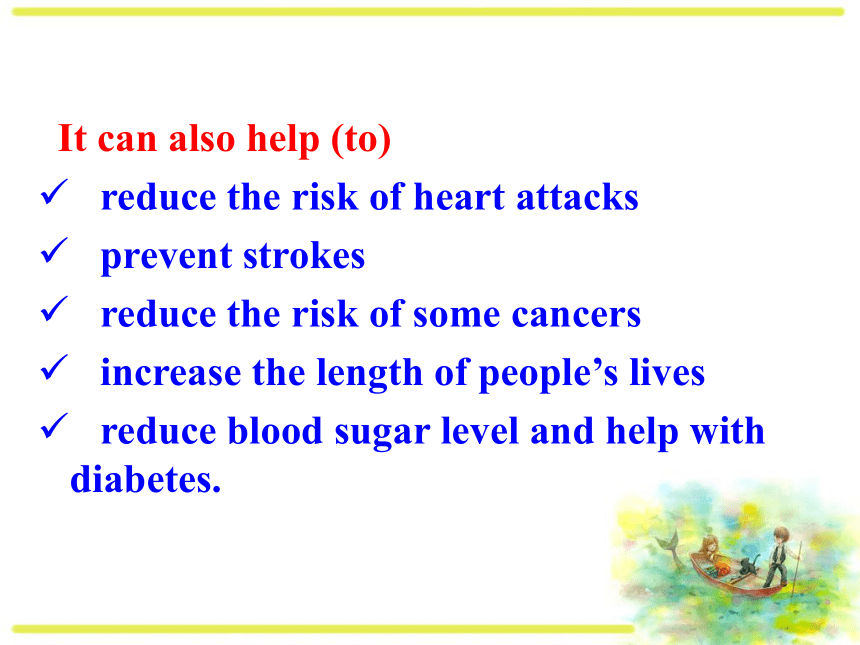
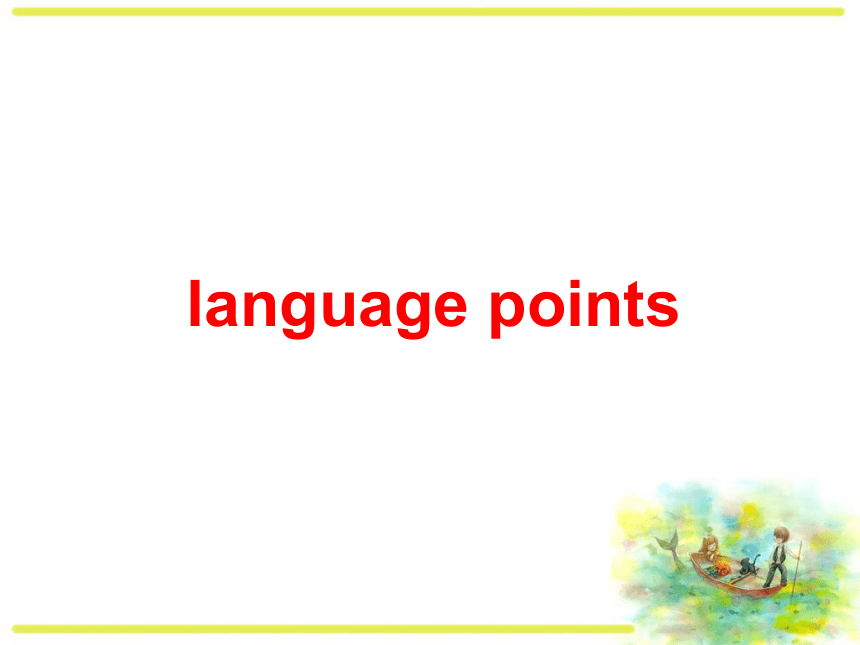
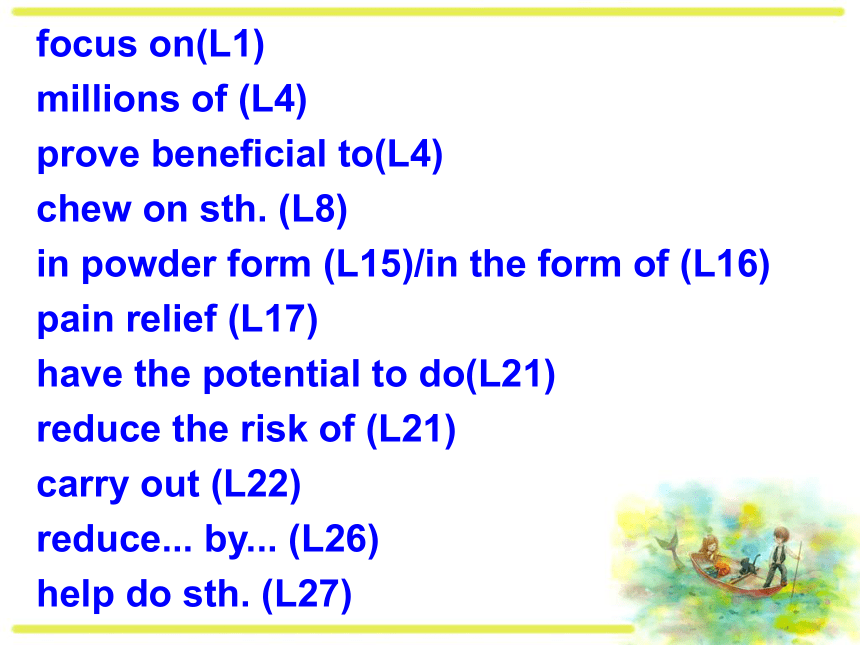
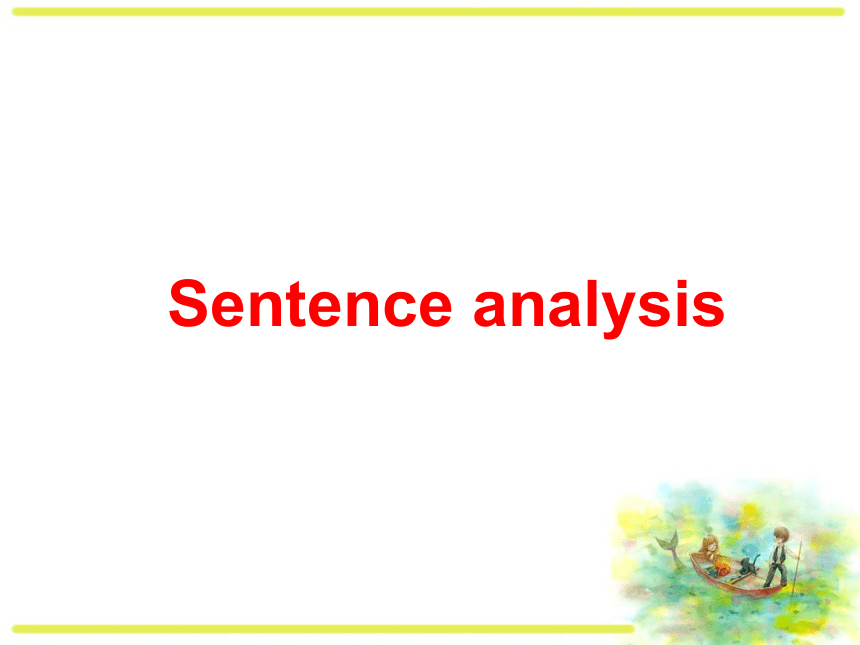
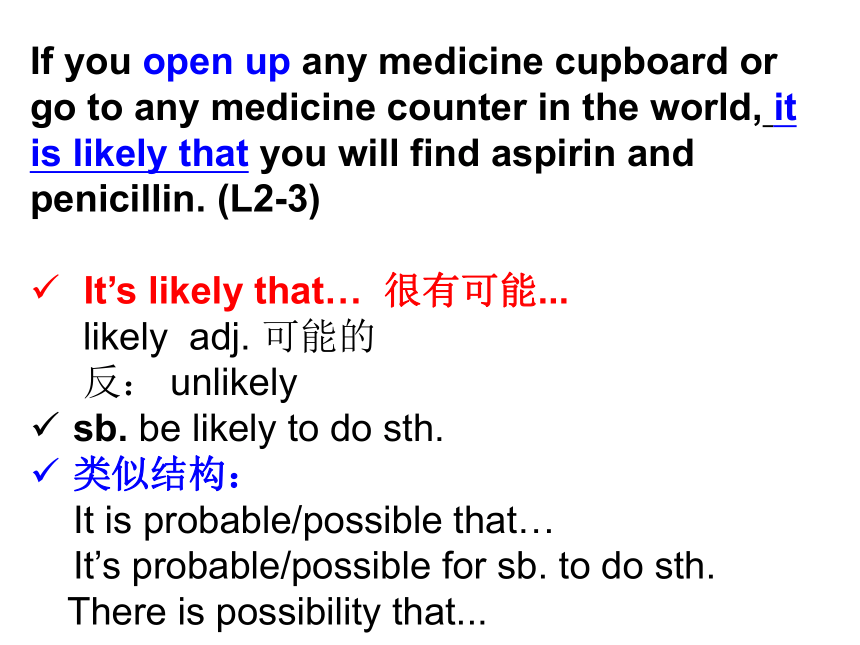
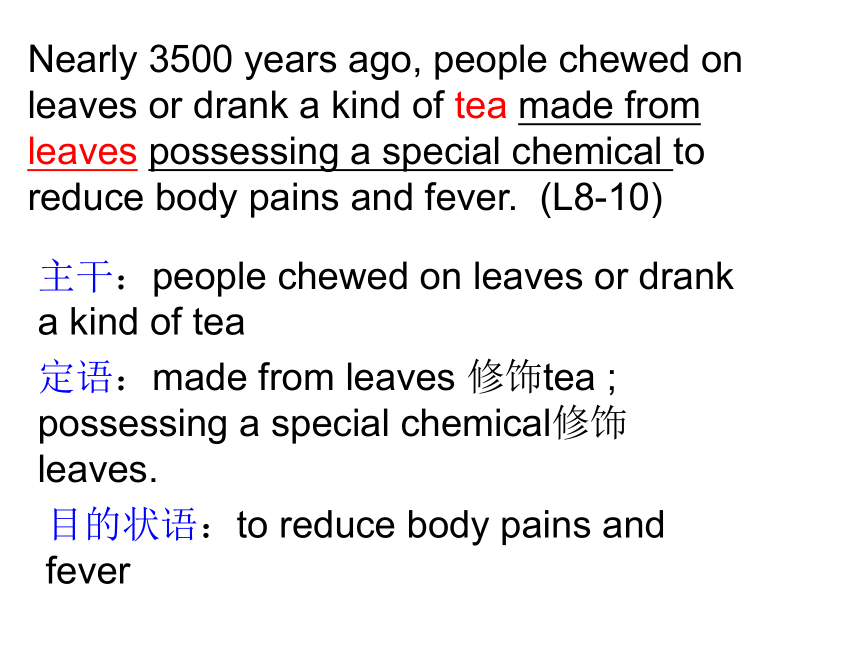
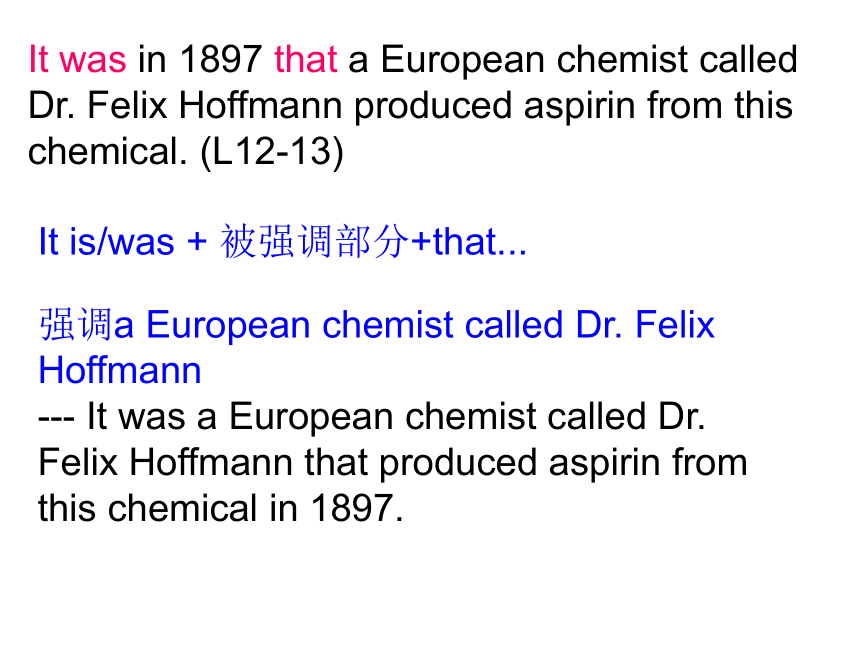
文档简介
(共47张PPT)
Look
at
the
pictures
on
page
17.
Would
you
like
to
do
any
of
the
jobs
shown
in
the
pictures?
New
words
drug
revolution
medicine
counter
likely
beneficial
invent
chemical
chew
possess
physician
chemist
risk
tree
bark
contain
trial
distribute
powder
tablet
form
pain
relief
vital
potential
stroke
diabetes
What
are
the
two
medicines
mentioned
in
the
article?
When
was
penicillin
first
discovered?
What
did
Fleming,
Florey
and
Chain
share?
When
did
people
find
that
drinking
a
special
tea
could
reduce
fever
and
pain?
When
was
aspirin
first
made?
What
is
the
main
idea
of
paragraph
3?
A.
The
history
of
aspirin
B.
Aspirin
can
reduce
heart
attack
C.
Other
functions
of
aspirin
besides
reducing
pain
and
fever.
√
It
can
also
help
(to)
reduce
the
risk
of
heart
attacks
prevent
strokes
reduce
the
risk
of
some
cancers
increase
the
length
of
people’s
lives
reduce
blood
sugar
level
and
help
with
diabetes.
language
points
focus
on(L1)
millions
of
(L4)
prove
beneficial
to(L4)
chew
on
sth.
(L8)
in
powder
form
(L15)/in
the
form
of
(L16)
pain
relief
(L17)
have
the
potential
to
do(L21)
reduce
the
risk
of
(L21)
carry
out
(L22)
reduce...
by...
(L26)
help
do
sth.
(L27)
Sentence
analysis
If
you
open
up
any
medicine
cupboard
or
go
to
any
medicine
counter
in
the
world,
it
is
likely
that
you
will
find
aspirin
and
penicillin.
(L2-3)
It’s
likely
that…
很有可能...
likely
adj.
可能的
反:
unlikely
sb.
be
likely
to
do
sth.
类似结构:
It
is
probable/possible
that…
It’s
probable/possible
for
sb.
to
do
sth.
There
is
possibility
that...
Nearly
3500
years
ago,
people
chewed
on
leaves
or
drank
a
kind
of
tea
made
from
leaves
possessing
a
special
chemical
to
reduce
body
pains
and
fever.
(L8-10)
主干:people
chewed
on
leaves
or
drank
a
kind
of
tea
定语:made
from
leaves
修饰tea
;
possessing
a
special
chemical修饰leaves.
目的状语:to
reduce
body
pains
and
fever
It
was
in
1897
that
a
European
chemist
called
Dr.
Felix
Hoffmann
produced
aspirin
from
this
chemical.
(L12-13)
It
is/was
+
被强调部分+that...
强调a
European
chemist
called
Dr.
Felix
Hoffmann
---
It
was
a
European
chemist
called
Dr.
Felix
Hoffmann
that
produced
aspirin
from
this
chemical
in
1897.
Not
only
has
apirin
proved
vital
for
reducing
fever
and
helping
stop
pain,
but
there
are
also
other
things
that
aspirin
can
help
with.
(L18-20)
not
only...
but
(also)...
后所连接的词性必须对等。
not
only
连接两个分句,放于句首时,此分句要用部分倒装。
He
spoke
not
only
more
correctly,
but
more
easily.
The
poor
man
not
only
had
been
fined,
but
also
had
been
sent
to
prison.
It
is
vital
that...
“...是至关重要的”;从句中的谓语动词要用
“(should)+动词原形”
It
is
vital
that
every
piece
of
equipment
(should)
be
checked
before
the
experiment
4.In
a
mould
that
killed
bacteria.
5.It
might
be
used
to
treat
illnesses
caused
by
bacteria.
6.First
he
was
unable
to
find
a
proceduce
to
make
a
penicillin
pure
enough
to
work
as
a
medicine.
Second,
it
was
difficult
to
produce
penicillin
in
the
ample
quantities
nedded
to
be
effective.
be
considered
(to
be/as)
(L33)
in
contemporary
society
(L34)
note
(L35)
grow
bacteria
(L36)
try
out
on
sth.
(38-39)
have
an
application
in
treating
illnesses
(L40)
name
sb./sth.
sth.
(双宾语)
(L41-42)
work
as
(L44)
manage
to
do
sth.
(L47)
in
large
quantities
(L47-48)
due
to
the
widespread
use
of
(L50)
It
astonished
him
to
see
the
bacteria
surrounding
the
mould
dead,
which
meant
that
the
mould
had
killed
them.
It
astonished
sb.
to
see/find/
hear...
...让某人震惊
现在分词
“surrounding
the
mould”
充当bacteria的后置定语
关系代词“which”引导非限制性定语从句,指代_______________________________?
在从句中充当_________?
the
bacteria
surrounding
the
mould
dead
主语
If
penicillin
had
not
been
available,
many
people
would
have
died
from
sickness
or
even
small
wounds.
---与过去事实相反的虚拟语气
从句:had
done;
主句:
would
have
done
要是你早一点到的话,你就可以碰见他。
If
you
had
arrived
earlier,
you
would
have
met
him.
=
Had
you
arrived
earlier,
you
would
have
met
him.
Part
D:
revolution
beneficial
possess
circulate
astonish
approval
accelerate
having
a
good
effect
surprise
someone
very
much
agreement
to
go
ahead
with
a
plan
or
an
idea.
have
or
own
something.
make
something
happen
faster
than
usual
a
great
change
that
affexts
many
people
move
around
a
place
or
system
without
stopping
___
___
___
___
___
___
___
f
a
d
g
b
c
e
E
Read
this
passage
about
how
new
drugs
are
discovered.
Complete
it
with
the
words
in
the
box.
application
unable
sicknesses
potential
abnormal
effective
New
drugs
are
found
in
many
different
ways.
Some
vital
medicines
have
been
found
because
scientists
were
looking
for
then.
For
example,
Dr
Felix
Hoffmann
knew
of
different
traditional
medicines
that
could
provide
relief
for
symptons
such
as
fever
and
pain.
However,
these
traditional
medicines
had
the
(1)
_______
of
either
causing
people
to
bleed
or
have
a
severe
stomach
upset,
or
they
were
too
weak
to
be
(2)__________.
potential
effective
Dr
Hoffman
was
able
to
pick
out
one
of
these
traditional
medicines
and
make
it
more
beneficial.
Thus,
aspirin
was
born.
Today,
researchers
all
over
the
world
are
exploring
traditional
medicines
to
see
how
they
can
be
improved
and
applied
in
modern
medicine.
Other
drugs
are
discovered
by
accident.
For
example,
Alexander
Fleming
was
not
looking
for
penicillin,
but
was
doing
research
on
something
else.
Fleming
would
have
been
(3)
_______
to
make
his
discovery
if
he
had
ignored
the
mould.
unable
Since
it
was
(4)__________
for
mould
to
be
in
that
lad
dish,
something
must
have
gone
wrong.
Perhaps
the
dish
had
not
been
cleaned
using
the
proper
procedures.
Perhaps
a
window
had
been
opened,
and
the
mould
had
been
carried
in
by
the
wind.
We
will
never
know.
However,
with
the
(5)
___________of
his
discovery,
millions
of
people
have
been
cured
of
different(6)
__________.
What
other
happy
accidents
may
happen
in
the
future,
saving
many
lives?
abnormal
application
sicknesses
open
up:
phrasal
verb
(1)
to
show
something
that
was
hidden
or
not
previously
known:
The
debate
could
open
up
sharp
differences
between
the
countries.
这次辩论能够揭露这些国家之间的明显差异。
(2)
to
make
a
space
larger
or
less
enclosed:
We're
going
to
open
up
our
kitchen
by
knocking
down
a
couple
of
walls.
我们打算把墙壁推倒来扩大我们的厨房。
Language
Points
(3)
to
start
to
talk
more
about
yourself
and
your
feelings:
I've
never
opened
up
to
anyone
like
I
do
to
you.
我从来没有对任何人像对你一样地敞开心扉。
focus
on
sth.
聚焦于……
听讲座的时候,你应该特别关注演讲者的主要观点。
When
listening
to
a
lecture,
you
should
focus
on
the
speaker’s
main
points.
这个节目主要讲述了中国的太空探险。
The
program
mainly
focuses
on
China’s
space
exploration.
你必须把思想集中在解答难题上。
You
must
focus
your
mind
on
working
out
the
problem.
所有的目光都集中在演讲者的身上。
All
the
eyes
were
focused
on
the
speaker.
focus
one’s
mind/attention/eyes
on…
把…集中于…
to
be
the
focus
of
attention
成为注意力的中心
明星一走进大厅便成了大家注意的中心。
The
superstar
immediately
became
the
focus
of
attention
when
he
entered
the
hall.
环境保护的话题是我们这十年重点关注的东西。
The
topic
of
environmental
protection
is
our
focus
in
this
decade.
focus
n.
中心(点),集中点,焦点
他躺在草地上,眼睛凝视着天空。
He
lay
on
the
grass,
with
his
eyes
_______
on
the
sky.
focused
fixed
make…from…:
to
produce
something,
often
using
a
particular
substance
or
material:
Butter
is
made
out
of/from
milk.
黄油是用牛奶做的。
相关短语:
make…of…/be
made
of…
Earrings
are
made
of
gold.
make…into…/be
made
into
Wood
can
be
made
into
tables.
make
up/be
made
up
of…
Eleven
players
make
up
the
football
team.
The
football
team
is
made
up
of
eleven
players.
耳环是金子做的。
木头可以制成桌子。
11个队员组成了这支足球队。
这支足球队是由11个队员组成的。
trial:
noun
[C
or
U]
a
test,
usually
over
a
limited
period
of
time,
to
discover
how
effective
or
suitable
something
or
someone
is:
They've
employed
her
for
a
six-month
trial
(period).
他们雇佣她已经有6个月的试用期了。
这个新方法正在试用。
This
new
method
is
on
trial.
trial
and
error:
noun
a
way
of
achieving
an
aim
or
solving
a
problem
by
trying
a
number
of
different
methods
and
learning
from
the
mistakes
that
you
make
There's
no
instant
way
of
finding
a
cure
—
it's
just
a
process
of
trial
and
error.
找到一种治疗办法没有便捷的方式——这是
一个反复试验的过程。
in
any
shape
or
form:
of
any
type
I'm
opposed
to
war
in
any
shape
or
form.
我反对任何形式的战争。
in…form=in
the
form
of…
The
lawn
was
laid
out
in
the
form
of
the
figure
eight.
这块草坪是以八这个数字的形式设计的。
contain:
verb
[T
not
continuous]
to
have
something
inside
or
include
something
as
a
part:
How
much
liquid
do
you
think
this
bottle
contains?
你认为这个瓶子里装有多少水?
Try
to
avoid
foods
which
contain
a
lot
of
fat.
尽量不要吃含有很多脂肪的食物。
length:
noun
[C
or
U]
the
measurement
of
something
from
end
to
end
or
along
its
longest
side:
The
boat
is
ten
metres
in
length.
这艘船长10米。
(2)[C]
a
piece
of
something
such
as
string
or
pipe:
a
length
of
rope
一段绳子
(3)
[C]
the
amount
of
time
something
takes:
the
length
of
a
film/speech/play
一部电影/一篇讲话/一部戏剧的长短
keep
sb.
at
arm's
length:
to
not
allow
someone
to
become
too
friendly
with
you:
I
always
had
the
feeling
she
was
keeping
me
at
arm's
length.
我一直感觉她避免我和她亲近。
at
length:
If
something
happens
at
length,
it
happens
after
a
long
period
of
time:
At
length,
they
allowed
her
to
go
home.
终于他们允许她回家了。
(2)
in
great
detail
speak
at
(great)
length
详细得讲了好久
note:
verb
[T]
(1)to
notice
something:
They
noted
the
consumers'
growing
demand
for
quicker
service.
他们注意到了消费者们对更快的服务的日益
增长的需求。
I
failed
to
note
that
he
had
left.
我没有注意到他已经走了。
(2)importance,
or
when
something
deserves
attention:
noun
[U]
There
was
nothing
of
note
in
the
latest
report.
最近的报道里没有什么值得注意的。
noted
?adjective
known
by
many
people,
especially
because
of
particular
qualities:
She's
not
noted
for
her
patience
(=
She
is
not
a
patient
person).
她因为没有耐心而出名。
quantity:
n.
[C
or
U]
the
amount
or
number
of
sth.,
especially
that
can
be
measured
or
is
fixed:
Police
found
a
large/small
quantity
of
drugs
in
his
possession.
We
consumed
vast
quantities
of
food
and
drink
that
night.
警察发现他拥有大量的毒品。
那天晚上我们消费了大量的食物和饮料。
They
are
now
developing
ways
to
produce
the
vaccine
in
large
quantities
and
cheaply.
他们正在研制大批并且廉价地生产疫苗的方法。
表示“许多”的词或短语如下:
修饰可数名词的:many,
a
great/good
many,
quite
a
few,
a
large/great
number
of
/numbers
of,
many
a,
(2)修饰不可数名词的:much,
a
great
deal
of,
a
large
amount
of/large
amounts
of
(3)
既可以修饰可数又可以修饰不可数名词的:
a
lot
of/lots
of,
plenty
of,
a
large
quantity
of
/large
quantities
of,
a
mass
of,
masses
of
available:
adjective
able
to
be
obtained,
used,
or
reached:
Is
this
dress
available
in
a
larger
size?
这件礼服有大点尺寸的吗?
我们必须确保每个人都可以喝到新鲜的淡水。
We
must
make
sure
that
fresh
drinking
water
can
be
available
to
everyone.
die:
verb
[I]
dying,
died,
died
to
stop
living
or
existing,
either
suddenly
or
slowly:
She
died
of/from
hunger.
她死于饥饿。
die相关短语:
die
from:
死于(外因)
die
of:
死于(疾病,饥饿,严寒等内因)
die
away:
(声音等的)消逝
die
down:
(火势,怒气等的)平息
die
out:
(风俗习惯,物种等的)灭绝,消失
die
off:
相继死去直至死光
die
for:为……而死;渴望得到……
The
sound
of
his
footsteps
gradually
died
away.
他的脚步声渐渐地消失了。
It
was
several
minutes
before
the
applause
died
down.
几分钟后掌声才平息下来。
Dinosaurs
died
out
millions
of
years
ago.
恐龙是数百万年前灭绝的。
It's
a
custom
which
is
beginning
to
die
out.
这是一个开始消失的风俗。
His
parents
died
off
within
a
year.
他的父母在一年内相继去世。
I
am
dying
for/to
have
a
drink.
我口渴得要命。
Look
at
the
pictures
on
page
17.
Would
you
like
to
do
any
of
the
jobs
shown
in
the
pictures?
New
words
drug
revolution
medicine
counter
likely
beneficial
invent
chemical
chew
possess
physician
chemist
risk
tree
bark
contain
trial
distribute
powder
tablet
form
pain
relief
vital
potential
stroke
diabetes
What
are
the
two
medicines
mentioned
in
the
article?
When
was
penicillin
first
discovered?
What
did
Fleming,
Florey
and
Chain
share?
When
did
people
find
that
drinking
a
special
tea
could
reduce
fever
and
pain?
When
was
aspirin
first
made?
What
is
the
main
idea
of
paragraph
3?
A.
The
history
of
aspirin
B.
Aspirin
can
reduce
heart
attack
C.
Other
functions
of
aspirin
besides
reducing
pain
and
fever.
√
It
can
also
help
(to)
reduce
the
risk
of
heart
attacks
prevent
strokes
reduce
the
risk
of
some
cancers
increase
the
length
of
people’s
lives
reduce
blood
sugar
level
and
help
with
diabetes.
language
points
focus
on(L1)
millions
of
(L4)
prove
beneficial
to(L4)
chew
on
sth.
(L8)
in
powder
form
(L15)/in
the
form
of
(L16)
pain
relief
(L17)
have
the
potential
to
do(L21)
reduce
the
risk
of
(L21)
carry
out
(L22)
reduce...
by...
(L26)
help
do
sth.
(L27)
Sentence
analysis
If
you
open
up
any
medicine
cupboard
or
go
to
any
medicine
counter
in
the
world,
it
is
likely
that
you
will
find
aspirin
and
penicillin.
(L2-3)
It’s
likely
that…
很有可能...
likely
adj.
可能的
反:
unlikely
sb.
be
likely
to
do
sth.
类似结构:
It
is
probable/possible
that…
It’s
probable/possible
for
sb.
to
do
sth.
There
is
possibility
that...
Nearly
3500
years
ago,
people
chewed
on
leaves
or
drank
a
kind
of
tea
made
from
leaves
possessing
a
special
chemical
to
reduce
body
pains
and
fever.
(L8-10)
主干:people
chewed
on
leaves
or
drank
a
kind
of
tea
定语:made
from
leaves
修饰tea
;
possessing
a
special
chemical修饰leaves.
目的状语:to
reduce
body
pains
and
fever
It
was
in
1897
that
a
European
chemist
called
Dr.
Felix
Hoffmann
produced
aspirin
from
this
chemical.
(L12-13)
It
is/was
+
被强调部分+that...
强调a
European
chemist
called
Dr.
Felix
Hoffmann
---
It
was
a
European
chemist
called
Dr.
Felix
Hoffmann
that
produced
aspirin
from
this
chemical
in
1897.
Not
only
has
apirin
proved
vital
for
reducing
fever
and
helping
stop
pain,
but
there
are
also
other
things
that
aspirin
can
help
with.
(L18-20)
not
only...
but
(also)...
后所连接的词性必须对等。
not
only
连接两个分句,放于句首时,此分句要用部分倒装。
He
spoke
not
only
more
correctly,
but
more
easily.
The
poor
man
not
only
had
been
fined,
but
also
had
been
sent
to
prison.
It
is
vital
that...
“...是至关重要的”;从句中的谓语动词要用
“(should)+动词原形”
It
is
vital
that
every
piece
of
equipment
(should)
be
checked
before
the
experiment
4.In
a
mould
that
killed
bacteria.
5.It
might
be
used
to
treat
illnesses
caused
by
bacteria.
6.First
he
was
unable
to
find
a
proceduce
to
make
a
penicillin
pure
enough
to
work
as
a
medicine.
Second,
it
was
difficult
to
produce
penicillin
in
the
ample
quantities
nedded
to
be
effective.
be
considered
(to
be/as)
(L33)
in
contemporary
society
(L34)
note
(L35)
grow
bacteria
(L36)
try
out
on
sth.
(38-39)
have
an
application
in
treating
illnesses
(L40)
name
sb./sth.
sth.
(双宾语)
(L41-42)
work
as
(L44)
manage
to
do
sth.
(L47)
in
large
quantities
(L47-48)
due
to
the
widespread
use
of
(L50)
It
astonished
him
to
see
the
bacteria
surrounding
the
mould
dead,
which
meant
that
the
mould
had
killed
them.
It
astonished
sb.
to
see/find/
hear...
...让某人震惊
现在分词
“surrounding
the
mould”
充当bacteria的后置定语
关系代词“which”引导非限制性定语从句,指代_______________________________?
在从句中充当_________?
the
bacteria
surrounding
the
mould
dead
主语
If
penicillin
had
not
been
available,
many
people
would
have
died
from
sickness
or
even
small
wounds.
---与过去事实相反的虚拟语气
从句:had
done;
主句:
would
have
done
要是你早一点到的话,你就可以碰见他。
If
you
had
arrived
earlier,
you
would
have
met
him.
=
Had
you
arrived
earlier,
you
would
have
met
him.
Part
D:
revolution
beneficial
possess
circulate
astonish
approval
accelerate
having
a
good
effect
surprise
someone
very
much
agreement
to
go
ahead
with
a
plan
or
an
idea.
have
or
own
something.
make
something
happen
faster
than
usual
a
great
change
that
affexts
many
people
move
around
a
place
or
system
without
stopping
___
___
___
___
___
___
___
f
a
d
g
b
c
e
E
Read
this
passage
about
how
new
drugs
are
discovered.
Complete
it
with
the
words
in
the
box.
application
unable
sicknesses
potential
abnormal
effective
New
drugs
are
found
in
many
different
ways.
Some
vital
medicines
have
been
found
because
scientists
were
looking
for
then.
For
example,
Dr
Felix
Hoffmann
knew
of
different
traditional
medicines
that
could
provide
relief
for
symptons
such
as
fever
and
pain.
However,
these
traditional
medicines
had
the
(1)
_______
of
either
causing
people
to
bleed
or
have
a
severe
stomach
upset,
or
they
were
too
weak
to
be
(2)__________.
potential
effective
Dr
Hoffman
was
able
to
pick
out
one
of
these
traditional
medicines
and
make
it
more
beneficial.
Thus,
aspirin
was
born.
Today,
researchers
all
over
the
world
are
exploring
traditional
medicines
to
see
how
they
can
be
improved
and
applied
in
modern
medicine.
Other
drugs
are
discovered
by
accident.
For
example,
Alexander
Fleming
was
not
looking
for
penicillin,
but
was
doing
research
on
something
else.
Fleming
would
have
been
(3)
_______
to
make
his
discovery
if
he
had
ignored
the
mould.
unable
Since
it
was
(4)__________
for
mould
to
be
in
that
lad
dish,
something
must
have
gone
wrong.
Perhaps
the
dish
had
not
been
cleaned
using
the
proper
procedures.
Perhaps
a
window
had
been
opened,
and
the
mould
had
been
carried
in
by
the
wind.
We
will
never
know.
However,
with
the
(5)
___________of
his
discovery,
millions
of
people
have
been
cured
of
different(6)
__________.
What
other
happy
accidents
may
happen
in
the
future,
saving
many
lives?
abnormal
application
sicknesses
open
up:
phrasal
verb
(1)
to
show
something
that
was
hidden
or
not
previously
known:
The
debate
could
open
up
sharp
differences
between
the
countries.
这次辩论能够揭露这些国家之间的明显差异。
(2)
to
make
a
space
larger
or
less
enclosed:
We're
going
to
open
up
our
kitchen
by
knocking
down
a
couple
of
walls.
我们打算把墙壁推倒来扩大我们的厨房。
Language
Points
(3)
to
start
to
talk
more
about
yourself
and
your
feelings:
I've
never
opened
up
to
anyone
like
I
do
to
you.
我从来没有对任何人像对你一样地敞开心扉。
focus
on
sth.
聚焦于……
听讲座的时候,你应该特别关注演讲者的主要观点。
When
listening
to
a
lecture,
you
should
focus
on
the
speaker’s
main
points.
这个节目主要讲述了中国的太空探险。
The
program
mainly
focuses
on
China’s
space
exploration.
你必须把思想集中在解答难题上。
You
must
focus
your
mind
on
working
out
the
problem.
所有的目光都集中在演讲者的身上。
All
the
eyes
were
focused
on
the
speaker.
focus
one’s
mind/attention/eyes
on…
把…集中于…
to
be
the
focus
of
attention
成为注意力的中心
明星一走进大厅便成了大家注意的中心。
The
superstar
immediately
became
the
focus
of
attention
when
he
entered
the
hall.
环境保护的话题是我们这十年重点关注的东西。
The
topic
of
environmental
protection
is
our
focus
in
this
decade.
focus
n.
中心(点),集中点,焦点
他躺在草地上,眼睛凝视着天空。
He
lay
on
the
grass,
with
his
eyes
_______
on
the
sky.
focused
fixed
make…from…:
to
produce
something,
often
using
a
particular
substance
or
material:
Butter
is
made
out
of/from
milk.
黄油是用牛奶做的。
相关短语:
make…of…/be
made
of…
Earrings
are
made
of
gold.
make…into…/be
made
into
Wood
can
be
made
into
tables.
make
up/be
made
up
of…
Eleven
players
make
up
the
football
team.
The
football
team
is
made
up
of
eleven
players.
耳环是金子做的。
木头可以制成桌子。
11个队员组成了这支足球队。
这支足球队是由11个队员组成的。
trial:
noun
[C
or
U]
a
test,
usually
over
a
limited
period
of
time,
to
discover
how
effective
or
suitable
something
or
someone
is:
They've
employed
her
for
a
six-month
trial
(period).
他们雇佣她已经有6个月的试用期了。
这个新方法正在试用。
This
new
method
is
on
trial.
trial
and
error:
noun
a
way
of
achieving
an
aim
or
solving
a
problem
by
trying
a
number
of
different
methods
and
learning
from
the
mistakes
that
you
make
There's
no
instant
way
of
finding
a
cure
—
it's
just
a
process
of
trial
and
error.
找到一种治疗办法没有便捷的方式——这是
一个反复试验的过程。
in
any
shape
or
form:
of
any
type
I'm
opposed
to
war
in
any
shape
or
form.
我反对任何形式的战争。
in…form=in
the
form
of…
The
lawn
was
laid
out
in
the
form
of
the
figure
eight.
这块草坪是以八这个数字的形式设计的。
contain:
verb
[T
not
continuous]
to
have
something
inside
or
include
something
as
a
part:
How
much
liquid
do
you
think
this
bottle
contains?
你认为这个瓶子里装有多少水?
Try
to
avoid
foods
which
contain
a
lot
of
fat.
尽量不要吃含有很多脂肪的食物。
length:
noun
[C
or
U]
the
measurement
of
something
from
end
to
end
or
along
its
longest
side:
The
boat
is
ten
metres
in
length.
这艘船长10米。
(2)[C]
a
piece
of
something
such
as
string
or
pipe:
a
length
of
rope
一段绳子
(3)
[C]
the
amount
of
time
something
takes:
the
length
of
a
film/speech/play
一部电影/一篇讲话/一部戏剧的长短
keep
sb.
at
arm's
length:
to
not
allow
someone
to
become
too
friendly
with
you:
I
always
had
the
feeling
she
was
keeping
me
at
arm's
length.
我一直感觉她避免我和她亲近。
at
length:
If
something
happens
at
length,
it
happens
after
a
long
period
of
time:
At
length,
they
allowed
her
to
go
home.
终于他们允许她回家了。
(2)
in
great
detail
speak
at
(great)
length
详细得讲了好久
note:
verb
[T]
(1)to
notice
something:
They
noted
the
consumers'
growing
demand
for
quicker
service.
他们注意到了消费者们对更快的服务的日益
增长的需求。
I
failed
to
note
that
he
had
left.
我没有注意到他已经走了。
(2)importance,
or
when
something
deserves
attention:
noun
[U]
There
was
nothing
of
note
in
the
latest
report.
最近的报道里没有什么值得注意的。
noted
?adjective
known
by
many
people,
especially
because
of
particular
qualities:
She's
not
noted
for
her
patience
(=
She
is
not
a
patient
person).
她因为没有耐心而出名。
quantity:
n.
[C
or
U]
the
amount
or
number
of
sth.,
especially
that
can
be
measured
or
is
fixed:
Police
found
a
large/small
quantity
of
drugs
in
his
possession.
We
consumed
vast
quantities
of
food
and
drink
that
night.
警察发现他拥有大量的毒品。
那天晚上我们消费了大量的食物和饮料。
They
are
now
developing
ways
to
produce
the
vaccine
in
large
quantities
and
cheaply.
他们正在研制大批并且廉价地生产疫苗的方法。
表示“许多”的词或短语如下:
修饰可数名词的:many,
a
great/good
many,
quite
a
few,
a
large/great
number
of
/numbers
of,
many
a,
(2)修饰不可数名词的:much,
a
great
deal
of,
a
large
amount
of/large
amounts
of
(3)
既可以修饰可数又可以修饰不可数名词的:
a
lot
of/lots
of,
plenty
of,
a
large
quantity
of
/large
quantities
of,
a
mass
of,
masses
of
available:
adjective
able
to
be
obtained,
used,
or
reached:
Is
this
dress
available
in
a
larger
size?
这件礼服有大点尺寸的吗?
我们必须确保每个人都可以喝到新鲜的淡水。
We
must
make
sure
that
fresh
drinking
water
can
be
available
to
everyone.
die:
verb
[I]
dying,
died,
died
to
stop
living
or
existing,
either
suddenly
or
slowly:
She
died
of/from
hunger.
她死于饥饿。
die相关短语:
die
from:
死于(外因)
die
of:
死于(疾病,饥饿,严寒等内因)
die
away:
(声音等的)消逝
die
down:
(火势,怒气等的)平息
die
out:
(风俗习惯,物种等的)灭绝,消失
die
off:
相继死去直至死光
die
for:为……而死;渴望得到……
The
sound
of
his
footsteps
gradually
died
away.
他的脚步声渐渐地消失了。
It
was
several
minutes
before
the
applause
died
down.
几分钟后掌声才平息下来。
Dinosaurs
died
out
millions
of
years
ago.
恐龙是数百万年前灭绝的。
It's
a
custom
which
is
beginning
to
die
out.
这是一个开始消失的风俗。
His
parents
died
off
within
a
year.
他的父母在一年内相继去世。
I
am
dying
for/to
have
a
drink.
我口渴得要命。
